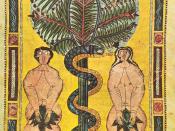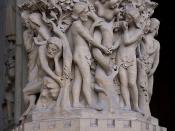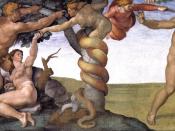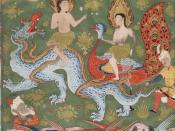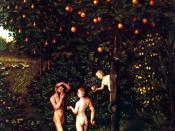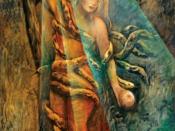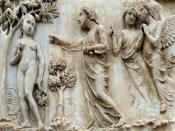"The Meaning of the Tree of Life" There is much symbolism to be found in what we know as the Tree of Life from the bible. When many people hear the phrase "tree of life" they most often associate it with the Garden of Eden depicted in Genesis 2:9. This verse reads, "And out of the ground the Lord God made every tree grow that is pleasant to the sight and good for food. The tree of life was also in the midst of the garden, and the tree of the knowledge of good and evil."(The New American Bible) One of the first and most basic questions usually asked, on this subject, is the actual number of trees that are featured in the text. Many wonder, are there two trees, and if so, do they mean two different things but are just put together in one creation recount? Or is this just one tree with two different names? Some argue, how can two trees both be in the same physical spot, in the middle of the garden? (Von Rad, p.
76) Because the author said the trees were both "in the midst of the garden", I don't think that should be interpreted as both being in the exact center. Life and knowledge are two completely different concepts. Neither is that closely related to make such claims such as them being synonymous with each other. The mentioning of two trees also appears in chapter three of Genesis, "ÃÂ"And the Lord god said, "ÃÂNow that the man has become like one of us, knowing good and bad, what if he should stretch out his hand and take also from the tree of life and eat, and live forever!'" The last time the Tree of Life is mentioned in Genesis is in the final verse of chapter three: " He drove the man out, and stationed east of the garden of Eden the cherubim and the fiery ever-turning sword, to guard the way to the tree of life." (The New American Bible) One interpretation of the tree of life is that it gives a person knowledge of as seen in Adam and Eve after they had first eaten the fruit and that they were naked. Also, other images in the narrative, such as fig leaves, and the serpent even, are associated with fertility and procreation in various ancient Near Eastern traditions. (Reicke, p 197) What can be concluded from these verses? When reading these passages, it is almost necessary to have somewhat of a background on the tradition of a tree whose fruits give eternal life to those who eat from it. (Cassuto, p 109.) Eve's punishment of painful child bearing and a sort of self-contradicting desire for her husband fits in well with this understanding. The phrase "knowledge of good and evil" occurs in Samuel 19:36 and is a metaphor for sexual desire. This interpretation can be applied to the Tree of Knowledge proving that there are parallels between them. (Reicke, p 196-7) Because the Tree of Life plays an important role in the story of the Fall, many good questions come out of it. Why did God prohibit this tree? What is the knowledge that is gained from it? Why would God deny his creation such knowledge? Why did it attract humans so much that they would disobey God and eat the fruit, when they could have had fruit from any other tree in the Garden? The answer lies in the nature of curiosity and the knowledge of good and evil. A second sense of good and evil is ethical behavior, to know right from wrong. Adam and Eve, even when they were innocent, already knew distinctively. Humans, in their natural state, instinctively choose good over evil. There really was no choice involved; it was only after they ate the fruit from the tree that they needed the powers of discernment. Herold Stern explains the Israelite idea of morality as this: For the Israelite to be involved in a situation when he is torn between alternatives, and must make a choice, is a sign of an unhealthy, deceased organism. To be forced to choose between alternatives, one of them is good and the others evil, is a sign the organism has lost its simple direct orientation to its natural good and is tempted with alternative modes of action. (Stern p. 409) This knowledge was not ethical distinction, since Adam and Eve were already moral. "Good and evil" in this narrative must mean knowledge of unnatural things which would include, but not limited to, sexual acts. Some see problems with the creation narrative in the Garden of Eden. First, God prohibits the Tree of Knowledge even before eh gives Adam a mate. Immediately after, we are told that they were ashamed of their nudity. This was saying there was no guilt about their sexuality. It does not make sense that God would forbid sexual knowledge and procreation before such knowledge or activity was even possible, and then go ahead and make such a temptation for Adam. (Stern, p. 406-409) God told Adam and Eve that if they were to eat from the Tree of Knowledge, they would surely die. There were no such limitations on the Tree of Life. This tree would enable them both to live forever. The punishment they both sustained as a result from eating the forbidden fruit is that Adam is now responsible to use his newfound knowledge to care for himself, whereas before, God took care of everything. Adam and Eve are banished from the Garden, and the Tree of Life is now guarded for their own protection. Having new knowledge and then having to live forever would have been eternal hell for them both. (Stern, p. 412) The Tree of Life can be represented as Jesus, the source of life. The tree of Knowledge can be seen as the devil or Satan. The Genesis narrative that included the Tree of Life and the Tree of Knowledge is meant to explain the introduction of evil into the world. This story sees this knowledge as wrong and unnatural. Today, knowledge is seen as power and we as a society, have done so much with our mind to improve our quality of life on this planet. The only way to really appreciate this ancient Israelite ideal is to look at some of the consequences of our vast knowledge such as nuclear bombs and cloning. These two trees have given so much insight to ancient Israel's way of life and idealology.
Works Cited Cassuto, Umberto. A Commentary on the Book of Genesis. Trans. Isreal Abrahams. Jerusalem: Central Press, 1961.
Reicke, Bo. "The Knowledge Hidden in Paradise." 1956.
Stern, Herold. "The Knowledge of Good and Evil." Vetus Testmentum, 9 1958.
Von Rad, Gehard. Genesis: A Commentary. John H. Marks.
Philadelphia: Westminster Press, 1961.
